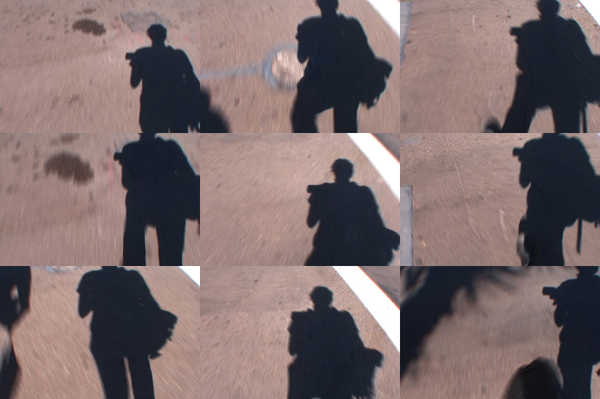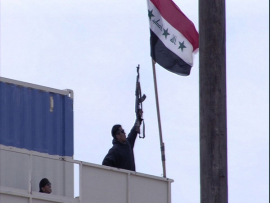
Caleb Waldorf: Ecologies of Suspicion
Submitted by Under Fire on Wed, 2006-11-08 19:51.

Scenario
You are on vacation. As any good tourist you have your camcorder and are filming everything in sight.
-cut-
You dump your video to your computer after arriving to your hotel. While watching the footage you notice that you accidentally left the camera running. It captured your shadow traversing the sidewalk and intersection as you crossed the street. You laugh at yourself, close your computer for the night to get ready for the long plane ride home tomorrow.
-cut-
At the airport you check your bags and prepare to go through inspection. You've worn slip-ons. Keys and change are stashed in your bag. You’ve already pulled your laptop out, and are ready to pass quickly through security. As you meet the first in a series of security guards your ID and boarding pass is held upright and ready. You smile innocently, if not somewhat guiltily waiting to be passed to the next step. The security guard tells you to go stand to the side and wait. Your boarding pass has been marked and you must go through further inspection. You are taken to a small cubicle and asked a series of questions. You explain that there must be some mistake, you were just on vacation and returning home. The officer ignores your claim and decides that he needs to look through your bag and your computer. He boots up your computer, and notices a movie file on your desktop titled "site-seeing.mov." He opens the file and begins to watch.
-cut-
A pan upwards of a tall building. A long shot of a hotel. A group of children playing around a monument. Another tall building. Your shadow across the pavement as you walk.
the clip ends.
The officer plays it back, pausing on innocuous frames...stopping on a moment that looks no different than any other - a blurry figure here, an entrance there, etc.
He asks you why you shot footage of these specific buildings, why you left the camera running while walking. You answer innocently enough and apologize for the poor camera work...
The officer closes your computer. Slowly he turns and fixes his gaze upon you. He pauses. You are then told that this is a surveillance video for a plan of attack. The sequence of your footsteps was a marking off of the distance for a suicide bombing. He tells you that you wanted it to appear as an accident so no one would suspect you. In reality you are using the conventions of the vacation video as a means to mask your true intentions.
----------------
What is the relationship that arises in this scenario between the subject, the officer, the camera and the image? The perceptual modality embodied by the officer viewing the vacation video emerges from a post-9/11 culture of fear in the United States. Codes of suspicion, diffused throughout society, are deployed to identify threats and regulate subjects. As we have been told repeatedly, the war on terror is one with no clear end. It carries with it the logic of preemption and creates an environment where everyone can potentially become an enemy. Codes of suspicion transform the ways we see the innocuous.
The attached stills are traces of "performances." I enact the tourist becoming terrorist, playing out my potential doppelganger self. I track the spaces that could be identified as tourist locations and/or targets. Within these spaces I redeploy visual conventions of the “home movie” and point to their re-valuation through the codes of suspicion. What I attempt to do here is embody these various positionalities – body/apparatus/officer - and demonstrate the ways we modulate between these roles. In effect, I’m attempting to act out how a way of seeing also becomes a way of thinking…the tourist becomes terrorist, the citizen becomes police, the police becomes media theorist.
click here for more images
>Caleb Waldorf

Scenario
You are on vacation. As any good tourist you have your camcorder and are filming everything in sight.
-cut-
You dump your video to your computer after arriving to your hotel. While watching the footage you notice that you accidentally left the camera running. It captured your shadow traversing the sidewalk and intersection as you crossed the street. You laugh at yourself, close your computer for the night to get ready for the long plane ride home tomorrow.
-cut-
At the airport you check your bags and prepare to go through inspection. You've worn slip-ons. Keys and change are stashed in your bag. You’ve already pulled your laptop out, and are ready to pass quickly through security. As you meet the first in a series of security guards your ID and boarding pass is held upright and ready. You smile innocently, if not somewhat guiltily waiting to be passed to the next step. The security guard tells you to go stand to the side and wait. Your boarding pass has been marked and you must go through further inspection. You are taken to a small cubicle and asked a series of questions. You explain that there must be some mistake, you were just on vacation and returning home. The officer ignores your claim and decides that he needs to look through your bag and your computer. He boots up your computer, and notices a movie file on your desktop titled "site-seeing.mov." He opens the file and begins to watch.
-cut-
A pan upwards of a tall building. A long shot of a hotel. A group of children playing around a monument. Another tall building. Your shadow across the pavement as you walk.
the clip ends.
The officer plays it back, pausing on innocuous frames...stopping on a moment that looks no different than any other - a blurry figure here, an entrance there, etc.
He asks you why you shot footage of these specific buildings, why you left the camera running while walking. You answer innocently enough and apologize for the poor camera work...
The officer closes your computer. Slowly he turns and fixes his gaze upon you. He pauses. You are then told that this is a surveillance video for a plan of attack. The sequence of your footsteps was a marking off of the distance for a suicide bombing. He tells you that you wanted it to appear as an accident so no one would suspect you. In reality you are using the conventions of the vacation video as a means to mask your true intentions.
----------------
What is the relationship that arises in this scenario between the subject, the officer, the camera and the image? The perceptual modality embodied by the officer viewing the vacation video emerges from a post-9/11 culture of fear in the United States. Codes of suspicion, diffused throughout society, are deployed to identify threats and regulate subjects. As we have been told repeatedly, the war on terror is one with no clear end. It carries with it the logic of preemption and creates an environment where everyone can potentially become an enemy. Codes of suspicion transform the ways we see the innocuous.
The attached stills are traces of "performances." I enact the tourist becoming terrorist, playing out my potential doppelganger self. I track the spaces that could be identified as tourist locations and/or targets. Within these spaces I redeploy visual conventions of the “home movie” and point to their re-valuation through the codes of suspicion. What I attempt to do here is embody these various positionalities – body/apparatus/officer - and demonstrate the ways we modulate between these roles. In effect, I’m attempting to act out how a way of seeing also becomes a way of thinking…the tourist becomes terrorist, the citizen becomes police, the police becomes media theorist.
click here for more images
>Caleb Waldorf

